Two Compact Ship Assist Tugs Delivered to US Owner
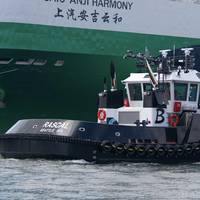
Robert Allan Ltd. has announced the delivery of two very compact high bollard pull ship handling tugs, Rascal and Rowdy, to Brusco Tug & Barge in the US.The RAscal 2000-D series tugs were constructed at Diversified Marine Inc. of Portland, Oregon, and at over 40 short tons are the highest bollard pull tugs of this size designed to date by Robert Allan Ltd.These compact tugs are well suited for harbors where smaller though still powerful ship assist tugs are needed, as well as being available for general harbor and coastal towing.
ABS Expands Singapore Footprint
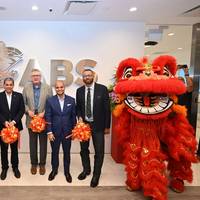
Increasing demand from shipowners for ABS services in Singapore has prompted ABS to invest in an expanded regional head office housing research and development capabilities.The Science Park Drive facility will also include a new Operation Support Center to support expanded remote survey capabilities in the Pacific region.“ABS has been investing in ensuring our capabilities in Singapore are cutting edge and able to support our clients’ rapidly evolving needs. Now we have brought…
ABS Signs Talent Development MoU in Singapore
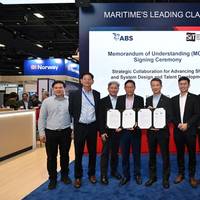
ABS and the Singapore Institute of Technology (SIT) signed an MoU at Singapore Maritime Week last week to advance innovations in applied research in maritime technology and enhance talent development within the global maritime and offshore industries.The collaboration advances applied research in vessel system design, including ship power simulations with hardware-in-the-loop, shore-to-ship charging technologies and augmented and virtual reality tools for visualizing simulated…
Australia and Singapore Fund Green Fuel Projects
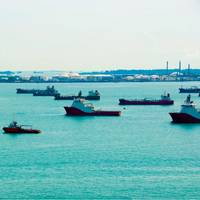
Australia and Singapore have selected eight projects for funding as part of a A$20 million ($12.6 million) initiative to help reduce emissions in the maritime sector.The Australia-Singapore Initiative on Low Emissions Technologies (ASLET) supports the objectives of the Singapore and Australia Green and Digital Shipping Corridor (GDSC), which will help accelerate decarbonization and digitization of shipping routes between Singapore and Australia. It is jointly delivered by the CSIRO…
ABS Wavesight Summit Brings Together Stakeholders and Experts

ABS Wavesight, the ABS-affiliated Software-as-a-Service company, proudly hosted its Vision and Value Summit in Singapore. The event brought together users of ABS Wavesight software products, industry stakeholders, and regional experts for a day of collaboration, innovation, and discussions.The event served as a platform for users and other industry stakeholders to connect with leaders and product teams across ABS and ABS Wavesight. Attendees engaged in interactive sessions focused on addressing critical issues…
Avikus Joins Consortium Working on Autonomous Navigation Standards
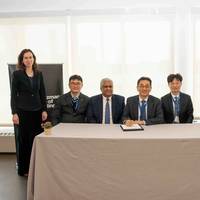
Autonomous navigation solution provider Avikus, a subsidiary of HD Hyundai, has joined the newly established MIT Maritime Consortium.Launched at the Massachusetts Institute of Technology (MIT) on March 18, 2025, the consortium brings together prominent maritime organizations to drive innovation and set international standards in autonomous navigation and maritime decarbonization.Avikus brings to the consortium its HiNAS Control system, an AI-based autonomous navigation solution.Founding members of the consortium include HD Korea Shipbuilding & Offshore Engineering (HD KSOE)…
ABS, MPA Expand Partnership to Drive Innovation, Workforce Development

New ABS Singapore Maritime Safety Centre to support immersive training in alternative fuels and safety operationsThe American Bureau of Shipping (ABS) and the Maritime and Port Authority of Singapore (MPA) have renewed their long-standing partnership with the signing of a multi-year Memorandum of Understanding (MOU) focused on accelerating maritime innovation, talent development, and regulatory collaboration. The expanded agreement reinforces Singapore’s position as a leading global maritime hub…
ABS, Pacific International Lines ink MOU
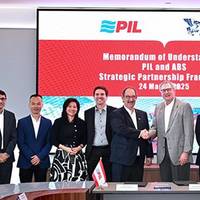
ABS and Pacific International Lines (PIL) signed a Memorandum of Understanding (MOU) at Singapore Maritime Week that establishes a framework to collaborate on projects related to maritime technology, sustainability and safety management systems.“To make meaningful progress in this era of rapid change, we need strategic industry collaborations like this one with PIL. We look forward to capitalizing on our unique strengths and capabilities in maritime compliance and cutting-edge technologies to advance safety, emissions reduction and operational efficiency,” said Christopher J.
Alfa Laval Inks Deal for Ammonia Fuel Supply System
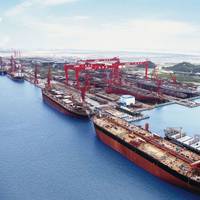
Alfa Laval has signed its first contract for the ammonia fuel supply system, FCM Ammonia.The FCM Ammonia will be installed on a CSSC Huangpu Wenchong shipyard in China for ship owner Tianjin Southwest Maritime (TSM). The installation will commence with three 25,000-cu. m. vessels, followed by four 41,000 cu. m. vessels.The FCM Ammonia contract follows testing and development conducted in close collaboration with WinGD. In December 2024, testing of the full fuel supply system, fuel valve train…
ABS Approves Framework for Autonomous Navigation Lifecycle Management
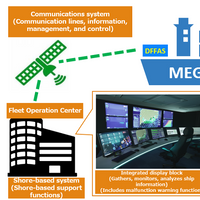
ABS has granted approval in principle to Monohakobi Technology Institute (MTI) for its Action Planning and Execution System (APExS-auto) maritime autonomy framework for the lifecycle management of autonomous navigation systems.The framework is crafted to be flexible, adapting to any necessary operational and design changes.The APExS-auto operational framework was developed by MTI, Nippon Yusen Kabushiki Kaisha and Japan Marine Science Inc. as part of the MEGURI 2040 fully autonomous ship program.The project utilized the System-Theoretic Process Analysis (STPA) method…
ABS Holds Inaugural South America Regional Committee Meeting
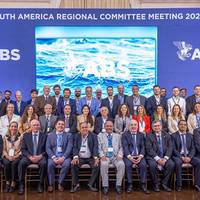
Maritime and offshore energy leaders from Brazil, Argentina, Chile and throughout South America came together for the first meeting of the ABS South America Regional Committee.“ABS has a long, proud history of many decades serving clients in South America, and we are excited to bring together a committee of esteemed colleagues to exchange ideas and engage in constructive discussions to support innovative solutions and forward progress in the maritime and offshore industries,” said Vassilios Kroustallis…
ABS Raises Concerns Over IMO’s ‘Wild Card’ Carbon Levy Proposal

Uncertainty about the scale and nature of the IMO’s proposed carbon levy is holding back investment in shipping, according to the Christopher J. Wiernicki, Chairman and CEO of American Bureau of Shipping (ABS).“A carbon levy is a wild card. It will all depend on how it is implemented and enforced. There’s a huge question mark over whether this will deliver for the industry and there is much still to be decided,” said Wiernicki.Wiernicki expressed his concerns during an appearance at CERAWeek energy conference.“Will the levy be set at $18, $100 or even $150 per ton?
Hybrid Warfare

This week, ABS issued type approval for IACS UR E27 cyber resilience requirements to Hanwha Systems for its cybersecurity solution SecuAider®.IACS requirements UR E26 “Cyber Resilience of Ships” and UR E27 “Cyber Resilience of On-Board Systems and Equipment” now apply to new ships, and they aim to help the industry protect itself from cyberattacks.Hybrid warfare tactics, where cyber campaigns precede or accompany physical confrontations, pose complex risks to maritime stakeholders, says Dryad Global.
ABS Approves Hanwha Cybersecurity Solution
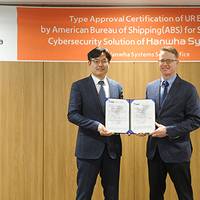
ABS issued a Type Approval for IACS UR E27 cyber resilience requirements to Hanwha Systems for its cybersecurity solution, SecuAider®.Hanwha Systems’ SecuAider® is a software solution that offers protection to a vessel’s data and networks from advanced cyberattacks, such as ransomware and malware.The ABS E27 certification is part of the ABS Cyber Resilience Program that evaluates a range of digitally enabled systems and equipment, looking at the security controls implemented at the design…
New Grain Loading Rules Allow for Special Compartment

ABS has provided guidance on the recent amendments to the International Code for the Safe Carriage of Grain in Bulk (Grain Code) that will become effective on January 1, 2026.Originally adopted in 1991, the Grain Code specified loading conditions for grain transport. However, these conditions did not account for all practical loading scenarios, particularly concerning "specially suitable compartments."The IMO has now defined a new loading condition which addresses compartments that are partly filled in the way of the hatch opening with ends untrimmed…
Pherousa Scoops ABS, DNV Approvals for Ammonia-Cracking Tech for Ships

Norwegian maritime technology company Pherousa has secured approvals in principle (AiPs) from American Bureau of Shipping (ABS) and DNV for its ammonia cracking technology onboard ships, featuring PEM Fuel Cells and Fuel Gas Supply System (FGSS) for fully electric propulsion.Pherousa, together with partners, is developing ammonia cracking technology that could make the transition to fossil-free and zero-emission propulsion within the maritime short- to deep-sea transport sectors a reality.Key partners in the work towards the two AiPs include the designers Deltamarin…
More Shipowners Take the LNG Path to 2050

The outcome of MEPC 83 in April could establish the IMO’s mid-term GHG and carbon pricing strategy for achieving net-zero by around 2050. Not everyone is waiting; they have enough confidence in the LNG pathway to order new ships.According to the latest figures from DNV’s Alternative Fuels Insight (AFI) platform, 34 new orders for alternative-fueled vessels were placed in February 2025, 33 of them for LNG-fueled container ships.The trend is continuing this week with CSSC subsidiary…
ABS Greenlights Kongsberg’s Digital Application for DP Systems

American Bureau of Shipping (ABS) has issued an approval in principle (AiP) for Kongsberg Maritime’s Dynamic Positioning Digital Survey (DPDS) application.The DPDS application from Kongsberg continuously gathers data from a vessel’s dynamic positioning (DP) system, allowing annual DP surveys to move from in-person assessments on the vessel in a fixed timeframe to remote analysis onshore across a wider, more flexible timeframe.According to Kongsberg, the DPDS app contributes to reduced vessel downtime and enhanced cost-efficiency of operations…
Is Nuclear Power Maritime’s Best Hope to hit ‘Net Zero’?

In the ever-evolving quest for cleaner, more efficient energy sources in maritime vessel operations, nuclear power has re-emerged as a topic of serious discussion, as shipowners eye the International Maritime Organization push to ‘net zero’ on or around 2050. Admittedly, there is no ‘silver bullet’ solution for the entirety of maritime premised on the wide variety of routes and ship types, but nuclear holds promise in several large-ship, oceangoing sectors. Phil Lewis, Director of Research at Intelatus…
ABS Finalizes Reports on Synthetic Fuels, Nuclear Power for EMSA

The European Maritime Safety Agency (EMSA) has published the final two reports in six series, focused on alternative fuels and decarbonization technologies. The reports were contracted from a consortium led by ABS, which includes CE Delft, Arcsilea, and Texas A&M University.A 360-degree analysis of nuclear power and synthetic fuels, specifically the renewable e-fuels of e-diesel, e-methane, and e-methanol, complete a project for EMSA designed to support the European Commission…
bound4blue Installs Wind-Assisted eSAILs on EPS’ Tanker
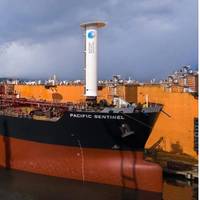
Spanish wind propulsion systems supplier bound4blue has installed its eSAIL wind assisted propulsion system on Pacific Sentinel tanker, owned by Eastern Pacific Shipping (EPS).Three 22-meter, DNV-Type Approved eSAILs were installed on the 50,000 dwt Pacific Sentinel in under a day per unit, as planned, bound4blue said.The installation occurred during a scheduled vessel drydock, with preparatory work completed in advance.The fully autonomous wind assisted propulsion system will…
ABS Sees Nuclear as ‘Generational Opportunity’ for US Shipbuilding

New nuclear reactor technology represents a once in a generation opportunity for U.S. industrial policy, as vessels propelled by advanced small modular reactors (SMR) could act as a catalyst for the revitalization of the country’s shipbuilding, according the Chairman and CEO of American Bureau of Shipping (ABS), Christopher J. Wiernicki.Wiernicki added he believes the next step is development of a marinized SMR demonstrator.“It is a key transformational technology. It changes the commercial model, the economics of shipping, the operation of the vessels and their design.
The Nuclear Option: ABS Grants AIP for 15K TEU Nuclear-Propelled Vessel Design
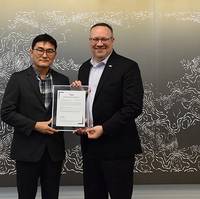
A nuclear-propelled containership designed by HD Korea Shipbuilding & Offshore Engineering (HD KSOE) received approval in principle from ABS.The design for a 15k TEU vessel uses a propulsion system comprised of a molten salt reactor (MSR) for heat and a supercritical carbon dioxide (SCO2) system for power generation. Unlike conventional ships, nuclear-powered vessels do not require engine exhaust systems or fuel tanks. HD KSOE has optimized the space previously occupied by large engine room equipment to accommodate additional containers, enhancing economic efficiency.

